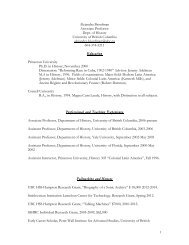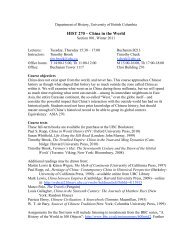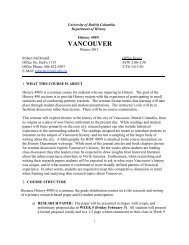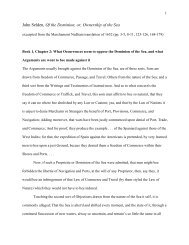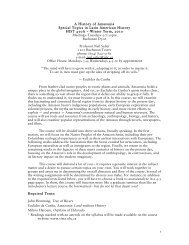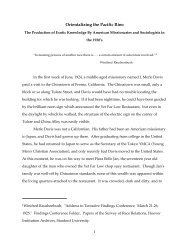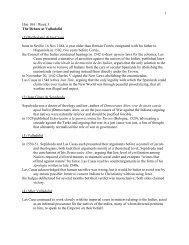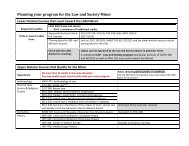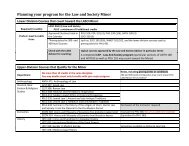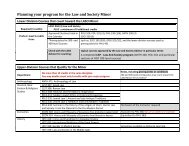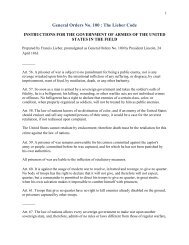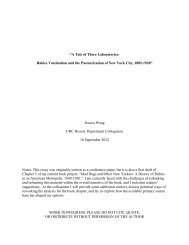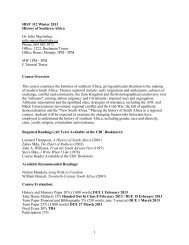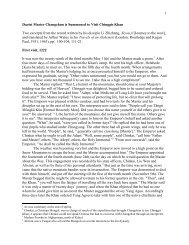Cooper Oral Sources.pdf - History, Department of
Cooper Oral Sources.pdf - History, Department of
Cooper Oral Sources.pdf - History, Department of
You also want an ePaper? Increase the reach of your titles
YUMPU automatically turns print PDFs into web optimized ePapers that Google loves.
190 WritingAfrican <strong>History</strong><br />
Griaule," Current Anthropology 32 (1991): 139-67 (including comments and response)<br />
which appears to throw into considerable doubt many <strong>of</strong> the conclusions Griaule dre:<br />
about Dogon life and cosmology.<br />
10. David Henige, "The Problem <strong>of</strong> Feedback in <strong>Oral</strong> Tradition: Four Examples<br />
from the Fante Coasclands,"Journal <strong>of</strong> African <strong>History</strong> 14 (1973): 223-35.<br />
11. David Henige, "'Truths Yet Unborn'? <strong>Oral</strong> Tradition as a Casualty <strong>of</strong> Culture<br />
Contact," Journal <strong>of</strong> African <strong>History</strong> 23 (1982): 395-412, and sources cited there.<br />
12. The matter is treated at great length in Henige, Chronology <strong>of</strong> <strong>Oral</strong> Tradition.<br />
13. GIGO, for "garbage in, garbage out," is an old computer saying.<br />
14. Richard Gray, "Eclipse Maps," Journal <strong>of</strong> African <strong>History</strong> 6 (1965): 251-62 and<br />
''Annular Eclipse Maps," Journal <strong>of</strong> African <strong>History</strong> 9 (1968): 147-57; David Henige,<br />
"'Day Was <strong>of</strong> Sudden Turned into Night': On the Use <strong>of</strong> Eclipses for Dating <strong>Oral</strong><br />
<strong>History</strong>," Comparative Studies in Society and <strong>History</strong> 18 (1976): 476-501.<br />
15. E.g., <strong>Oral</strong> <strong>History</strong>, <strong>Oral</strong> <strong>History</strong> Review, and Internationaljournal <strong>of</strong> <strong>Oral</strong> <strong>History</strong>.<br />
7<br />
ORAL SOURCES AND THE CHALLENGE<br />
OF AFRICAN HISTORY<br />
Barbara<br />
M. <strong>Cooper</strong><br />
African history, perhaps more than other domains <strong>of</strong> history, has had to<br />
be inventive in its use <strong>of</strong> sources and eclectic in its approach to evidence:<br />
Africanists draw upon linguistic, archaeological, ethnographic, genealogical,<br />
oral-performative, and oral-interview evidence in addition to the documentary<br />
sources more conventionally understood as primary sources<br />
within the discipline. This broad view <strong>of</strong> sources is due in large part to the<br />
relative paucity <strong>of</strong> written documentary materials for the continent. It<br />
would be a mistake, however, to overstate the absence <strong>of</strong> documentary<br />
sources for the construction <strong>of</strong> African history (see chapter 9, by John<br />
Thornton, in this volume): depending on the region and period in question,<br />
documentary evidence can be quite rich. It would be an even bigger<br />
mistake to imagine that African historians by and large rely on anyone<br />
kind <strong>of</strong> evidence to the exclusion <strong>of</strong> others-the long history <strong>of</strong> debate<br />
over the nature and suitability <strong>of</strong> oral tradition for the reconstruction <strong>of</strong><br />
the African past, which I shall discuss below, has obscured the reality that<br />
few historians rely exclusively on oral evidence in their work. Historical<br />
linguists supplement their thinking with archaeological evidence, archaeological<br />
historians draw inspiration from oral tradition, champions <strong>of</strong> oral<br />
evidence complement their work with documentary sources, and so on.<br />
Our confidence in our reconstructions <strong>of</strong> the past derives in part from the<br />
ways in which these various sources and methods, when used together, can<br />
refine, challenge, inspire, reinforce, or confirm one another. One <strong>of</strong> the<br />
most dramatic ways in which sources complement one another has been<br />
191
192 Writing African <strong>History</strong><br />
when oral traditions have been used to successfully locate important<br />
archaeological sites. 1<br />
In what follows I shall focus on oral historical data that is solicited<br />
by the researcher, in order to contextualize work on Africa that I regard as<br />
being in dialogue with the broader post-war development <strong>of</strong> oral history<br />
within the discipline <strong>of</strong> history. David Henige's contribution to this Volume<br />
(chapter 6) has addressed one important kind <strong>of</strong> oral evidence that<br />
has been central to the development <strong>of</strong> African history as a discipline,<br />
namely oral tradition. <strong>Oral</strong> traditions are generally stories about the past<br />
that local populations produce and reproduce through oral performative<br />
transmission, as a means <strong>of</strong> preserving their own history and consolidat_<br />
ing or contesting a sense <strong>of</strong> belonging and identity. <strong>Oral</strong> traditions can be<br />
cosmologically grounded; they <strong>of</strong>ten begin with myths <strong>of</strong> creation and go<br />
on to provide tales <strong>of</strong> origin for particular communities; they frequently<br />
celebrate the exploits <strong>of</strong> more or less legendary culture heroes; and they are<br />
dramatic and episodic. The performers <strong>of</strong> oral tradition are, perhaps above<br />
all else, as Joseph Miller remarks, good storytellers.?<br />
In this chapter I will discuss a closely related but distinguishable<br />
kind <strong>of</strong> evidence that is undoubtedly more familiar as historical evidence<br />
to historians <strong>of</strong> other regions, namely oral history. Since the development<br />
<strong>of</strong> reasonably portable recording technology after 1945, historians have<br />
attempted to supplement the biases and gaps in documentary data by eliciting<br />
interviews with some <strong>of</strong> the central but sometimes neglected participants<br />
in late nineteenth and twentieth century history: workers, women,<br />
minorities, ex-slaves, peasants, and community leaders. Such evidence has<br />
not been limited to the histories <strong>of</strong> those who are generally marginalized,<br />
however; oral evidence has enlivened biographies <strong>of</strong> well-known personages<br />
by providing perspectives, details, and color that are not available in<br />
primary documenrs.f <strong>Oral</strong> history, then, is personal reminiscence solicited<br />
by the researcher in an interview format, and it may focus on the life history<br />
<strong>of</strong> the person being interviewed, on specific events <strong>of</strong> interest to the<br />
historian, or on the subject's perhaps idiosyncratic memories <strong>of</strong> a family,<br />
neighborhood, community, or movement. Generally the temporal depth<br />
the historian attempts to recover through such evidence is limited to the<br />
actual memories <strong>of</strong> events in which the interlocutor took part and perhaps<br />
the interlocutor's reminiscences about hearing stories relevant to the topic<br />
<strong>of</strong> research. Here the stories are treated as idiosyncratic memories rather<br />
than as "oral traditions." The researcher tends not to lose sight <strong>of</strong> the individuality<br />
<strong>of</strong> the person being interviewed, however shaped his or her narrative<br />
might be by communal concerns.<br />
<strong>Oral</strong> <strong>Sources</strong> and the Challenge <strong>of</strong> African <strong>History</strong> 193<br />
The long commitment <strong>of</strong> Africanists to oral sources, whether they<br />
be traditions or personal narratives, derives from a healthy skepticism<br />
about permitting written sources, <strong>of</strong>ten produced by outsiders to the continent,<br />
to stand as the only recognized evidence about Africa's past.<br />
However complex or problematic the use <strong>of</strong> oral sources might be, the<br />
now-established tradition <strong>of</strong> commitment to their use is <strong>of</strong> a piece with a<br />
broader post-World War II commitment within history as a discipline to<br />
recuperate the unrecognized voices and experiences <strong>of</strong> the disadvantaged.<br />
That the use <strong>of</strong> oral sources is bound up with this broader democratic<br />
impulse has not always been recognized by Africanists, largely because<br />
debates about the use <strong>of</strong> oral sources have tended to focus upon how to<br />
systematically deploy "oral tradition" to gain chunks <strong>of</strong> usable evidence<br />
about the past rather than upon how to think about oral evidence, memory,<br />
and subjectivity more broadly. These debates have occluded somewhat<br />
the ways in which our work is in fact typical <strong>of</strong> much work done in<br />
social and cultural history since the 1960s. In our defensiveness about the<br />
recoverability <strong>of</strong> the history <strong>of</strong> the "barbarous tribes" derided by Hugh<br />
Trevor-Roper, we have neglected to engage in debate with the many historians<br />
<strong>of</strong> other parts <strong>of</strong> the world whose work has been very much in<br />
sympathy with our own. We have also, on the whole, missed an opportunity<br />
to share our own methodological insights with historians who might<br />
find them striking and useful. In this chapter I urge developing historians<br />
to draw on the shared methodological ground <strong>of</strong> oral history to begin to<br />
make African history more exciting and more accessible to our colleagues<br />
outside <strong>of</strong> African studies. Because African Studies is inevitably interdisciplinary,<br />
and because the use <strong>of</strong> oral history requires an interdisciplinary<br />
sensibility, we can for once turn our perceived weakness into a strength if<br />
we think more carefully about how our work intersects with work in history<br />
more broadly, and if we learn to pitch our writing in such a way that<br />
its relevance is more visible to outsiders.<br />
Debates Concerning <strong>Oral</strong> Tradition<br />
There have been four major moments <strong>of</strong> debate about the use and interpretation<br />
<strong>of</strong> oral tradition as history since the rise <strong>of</strong> African history as a<br />
formal academic discipline in the late 1950s. The first debate was implicitly<br />
between the champions <strong>of</strong> Africa as a place with a significant and<br />
recoverable history and those historians who, with Hugh Trevor-Roper,<br />
would dismiss the African past out <strong>of</strong> hand. Jan Vansina and his students
194 Writing African <strong>History</strong><br />
in particular worked tirelessly to develop a rigorous approach to the Use<strong>of</strong><br />
oral traditional evidence to recover the history <strong>of</strong> nonliterate peoples. 4<br />
Unfortunately this work did not engage particularly directly with two<br />
other important movements within history and popular memory in the<br />
same era, namely the growth <strong>of</strong> "democratic and popular" oral history<br />
projects in Britain under the aegis <strong>of</strong> such historians as Paul Thompson<br />
and the increased interest among African Americans seeking access to their<br />
own past inspired by Alex Haley's Roots? If anything Africanist historians,<br />
in the rush to gain credibility relative to more established historical fields,<br />
minimized the common ground between oral tradition and oral history<br />
and between African history and popular history. This has meant that<br />
Africanists have not tended to cite or engage with oral historians <strong>of</strong> other<br />
regions. It has also meant that, beyond the obligatory footnote, few oral<br />
historians <strong>of</strong> other regions have delved deeply into the work <strong>of</strong> central figures<br />
in African history such as Jan Vansina."<br />
More tragically, behind the scenes Africanist historians tended to<br />
belittle both the methods and the emotional impulse undergirding the<br />
African-American enthusiasm for oral history, with consequences that<br />
have been extremely damaging to African Studies as a whole. Rather than<br />
engage in constructive debate in a cooperative and supportive spirit,<br />
mainstream African history retreated to an academic high ground disengaged<br />
from the interests and resources <strong>of</strong> African-American popular<br />
authors and scholars. One result <strong>of</strong> this was that very little <strong>of</strong> the work<br />
produced by mainstream Africanist historians was taken up by a popular<br />
American audience. I regret that my own work, as much as anyone's, bears<br />
the marks <strong>of</strong> this legacy <strong>of</strong> omissions. This chapter is an opening venture<br />
towards ways in which Africanists might make their way into broader<br />
conversations.<br />
Within a decade or so a new stage in the debates had developed, for<br />
while Vansina and his students might have silenced (if not convinced) the<br />
skeptical historians, their argument that oral traditions consisted at least<br />
in part <strong>of</strong> orally transmitted memories <strong>of</strong> actual past events were vigorously<br />
challenged by anthropologists. Functionalists such as Laura<br />
Bohannon, following Malinowski, pointed out that much oral traditional<br />
evidence served as a charter to support contemporary political and social<br />
orders. <strong>Oral</strong> traditions, by this understanding, function to reproduce,<br />
adjudicate, and justify existing practices-they tell us a great deal about<br />
the present and relatively little about the past. To treat them as records <strong>of</strong><br />
the past is to render into fixity something which; in order to function<br />
properly as a homeostatic mechanism <strong>of</strong> social order, must in reality<br />
<strong>Oral</strong> <strong>Sources</strong> and the Challenge <strong>of</strong> African <strong>History</strong> 195<br />
remain fluid and changeable. This is what one might call the presentist<br />
critique <strong>of</strong> oral tradition as history? Structuralists such as Luc de Heusch,<br />
following Claude Levi-Strauss, emphasized instead the symbolic and<br />
universal dimensions <strong>of</strong> oral traditions that would seem to render them<br />
timeless rather than historical. Pointing out that historians tended to<br />
underplay the mythical elements in traditions, structuralists explored the<br />
central human dilemmas played out through myth, <strong>of</strong>fering what one<br />
might call the cosmological critique <strong>of</strong> oral traditions as history. This<br />
critique made comparatively literal readings <strong>of</strong> mythical elements <strong>of</strong><br />
traditions seem like wishful thinking. Instead structuralist anthropologists<br />
presented elegant interpretations <strong>of</strong> the mythic elements as symbols<br />
through which the human mind explores painful human paradoxes. 8<br />
Historians <strong>of</strong> Africa responded vigorously to the structuralist (cosmological)<br />
critique in 1980 in a major collection edited by Joseph Miller,<br />
The African Past Speaks, in which historians reflected more explicitly than<br />
usual upon the means by which evidence and hypotheses about the past<br />
can be derived from oral tradition. The volume clarifies how a close<br />
attention to the ways in which cultural understanding, political struggle,<br />
and memory shape or "structure" oral traditions will provide important<br />
methodological insights. In many ways the contributions revealed that<br />
it was more useful to focus on inconsistencies, disagreements, "seams,"<br />
and other anomalies within and between different oral traditions than to<br />
rely on the claims <strong>of</strong> the narratives themselves taken at face value.<br />
Historians had already begun to develop arguments for traditions as<br />
"complex ethnographic documents in which the narrative aspects may be<br />
among the least important elements for inferring history,"? The very structuring<br />
processes to be found shaping oral traditional evidence inevitably<br />
give rise to contradictions and inconsistencies that signal to the literate<br />
historian central problems, shifts, struggles, and noisy silences.<br />
Interestingly, in the same period historians such as Luisa Passerini<br />
and Alessandro Portelli were urging oral historians to shift away from seeing<br />
oral history as simply providing chunks <strong>of</strong> evidence about the past.<br />
They criticized the naive populism that uncritically accepts and celebrates<br />
oral interview evidence as the authentic vantage point <strong>of</strong> the subordinated<br />
population. Rather, they pointed to the role <strong>of</strong> subjectivity in history,<br />
drawing on silences, discrepancies, and idiosyncrasies to think about the<br />
social production <strong>of</strong> history and its contradictions. This vantage point not<br />
only led to a more critical use <strong>of</strong> oral sources but also opened the way to<br />
make fuller use <strong>of</strong> what is distinctive about oral sources: their foregrounding<br />
<strong>of</strong> the partiality and subjectivity <strong>of</strong> historical memory. As Portelli
196 Writing African <strong>History</strong><br />
remarks: "<strong>Oral</strong> history changes the writing <strong>of</strong> history much as the modern<br />
novel transformed the writing <strong>of</strong> literary fiction: the most important<br />
change is that the narrator is now pulled into the narrative and becomes a<br />
party <strong>of</strong> the story . . . the telling <strong>of</strong> the story is part <strong>of</strong> the Story being<br />
told."!" It is, to my mind, a terrible shame that the communities <strong>of</strong> historians<br />
working on tradition in Mrica and on oral historical evidence elsewhere<br />
did not begin to find significant grounds for convergence,<br />
comparison, and regrouping around the very issues <strong>of</strong> partiality, structuring,<br />
and subjectivity that both were attempting to come to terms with.<br />
One significant area in which such common ground <strong>of</strong> inquiry<br />
might have been forged was consideration <strong>of</strong> the role <strong>of</strong> feminist<br />
approaches to history and their implications for oral historical work. It is<br />
striking how much <strong>of</strong> the important work on oral history in Mrica has in<br />
fact arisen in the literature on women and gender (for a fuller treatment<br />
<strong>of</strong> the literature on gender in Mrica, see chapter 19, by Kathleen Sheldon,<br />
in this volume). Scholars seem to have been particularly inclined to turn<br />
to oral approaches to redress the triple erasure <strong>of</strong> African women from<br />
conventional documentary sources due to race, gender, and class positions.<br />
As a dual result, one rich literature uses women's life histories to<br />
anchor the work on oral history in Mrica and another draws on oral<br />
sources to inform the work on gender in Mrica. IlOne reason why the<br />
work on women's personal narratives has not fully articulated with oral<br />
historical work more <strong>of</strong>ten has been that much <strong>of</strong> it has been done by<br />
female scholars in disciplines other than history. Central examples would<br />
include Mary Smith's Baba <strong>of</strong> Karo and Marjorie Shostak's Nisal'? Many<br />
historians <strong>of</strong> Mrica who have attempted to seek out models for life history<br />
approaches have accordingly relied heavily on work in anthropology and<br />
sociology that has been less concerned to engage in explicit debates about<br />
oral history and has focused, rather, on debates in feminism, including<br />
discussions <strong>of</strong> the ethics <strong>of</strong> the research situation and the plausibility <strong>of</strong><br />
imagining that oral history is in some way transformative or liberating in<br />
itself 13<br />
Debates on oral tradition were, on the whole, oblivious to or deliberately<br />
distanced from developments in the realms <strong>of</strong> oral history and gender<br />
research. Even if, by the late 1980s, African historians committed to<br />
oral traditional sources had quieted the critiques <strong>of</strong> the structuralist<br />
anthropologists (having in the process become a good deal more sophisticated<br />
in terms <strong>of</strong> symbolic analysis as a result), the problems raised by the<br />
functionalists were harder to dismiss, partly because history as a discipline<br />
was itself struggling to come to terms with the problem <strong>of</strong> the invention<br />
<strong>Oral</strong> <strong>Sources</strong> and the Challenge <strong>of</strong> African <strong>History</strong> 197<br />
<strong>of</strong> tradition more broadly. This discovery <strong>of</strong>ten occurred precisely among<br />
those Mricanist scholars who had focused on the rare documentary space<br />
in which women were indeed likely to appear, if only in idealized form,<br />
namely the law. Works by such authors as Martin Chanock and Marcia<br />
Wright were making clear that as oral "tradition" was translated into the<br />
literate legal domain under colonial rule, the "customary law" that<br />
emerged was in fact a vehicle for struggles between men and women,<br />
elders and juniors, under the shifting circumstances <strong>of</strong> colonialism. 14 An<br />
awareness that tradition is not inert but is rather the product <strong>of</strong> human<br />
agency and can serve the agendas <strong>of</strong> various parties is, <strong>of</strong> course, one <strong>of</strong> the<br />
tools the historian can use to decode the structure <strong>of</strong> oral traditional<br />
accounts. The insights <strong>of</strong> Mricanists such as Terence Ranger were central<br />
to the growing attention to the issue <strong>of</strong> the uses <strong>of</strong> "tradition" throughout<br />
the discipline.P The functionalist observation-that "tradition" can be<br />
modified to accommodate and legitimize political positions in the present-opened<br />
the door to more troubling reflections about the construction<br />
<strong>of</strong> the past and the nature <strong>of</strong> interpretive authority. In the context <strong>of</strong><br />
recent interest in deconstruction (through which the logic <strong>of</strong> any text can<br />
be dismantled from within to reveal the subjectiveness <strong>of</strong> its claims to<br />
. knowledge), this insight has been pr<strong>of</strong>oundly unsettling to historians. It<br />
calls into question the objectivity <strong>of</strong> all historical accounts, implicates history<br />
in the very politics it strains to describe objectively, and undermines<br />
historians' confidence in the possibility <strong>of</strong> arriving at any final interpretation<br />
<strong>of</strong> the past.<br />
Most recently the debates about the uses <strong>of</strong> "tradition" in contemporary<br />
struggles have centered around Cohen and Odhiambo's Burying<br />
SM 16 The book describes, yet refuses ultimately to come to a conclusive<br />
interpretation <strong>of</strong>, a legal battle in Kenya between the widow <strong>of</strong> a prominent<br />
lawyer and the members <strong>of</strong> his clan over how he should be buried.<br />
In this legal battle in a modern courtroom, the central problem <strong>of</strong> how<br />
"authentic" understandings <strong>of</strong> traditional practices are to be determined<br />
came to a head as different modes <strong>of</strong> interpretive authority clashed. In the<br />
context <strong>of</strong> a legal battle, the phrases "traditional history" and "oral evidence"<br />
take on heightened meaning, for here the evidence is not simply to<br />
be used to construct a written text arguing for one interpretation or<br />
another <strong>of</strong> the past. The broader understanding <strong>of</strong> property, women's<br />
rights in Kenya, the role <strong>of</strong> the State in private lives, the ability <strong>of</strong> individuals<br />
to choose particular lifestyles, the nature <strong>of</strong> ethnicity-all were at<br />
stake in this case. The authors wryly note that "if one would bring methods<br />
<strong>of</strong> deconstruction to the close reading <strong>of</strong> the text <strong>of</strong> the case, one
198 Writing African <strong>History</strong><br />
should also recognize that practices <strong>of</strong> deconstruction were extensively<br />
deployed within the case by the cast <strong>of</strong> litigants, witnesses, counsel, and<br />
jurists themselves.?'" Anthropological, historical, and "traditional" evidence<br />
were all brought to bear in order to stake claims <strong>of</strong> different kinds<br />
over the body and to undermine other claims; these struggles, the authors<br />
argue, are constitutive <strong>of</strong>, rather than simply reflections <strong>of</strong>, Kenyan history<br />
and culture. <strong>History</strong> becomes, then, not the past itself, but struggles over<br />
the meaning <strong>of</strong> the past.<br />
A Manifesto<br />
The disquiet within the historical pr<strong>of</strong>ession concerning postmodernism,<br />
deconstruction, and, more diffusely, multiculturalism is likely to continue<br />
for some time to come. As Steven Feierman points out, the central paradox<br />
<strong>of</strong> our moment as historians is that "our faith in objective historical<br />
knowledge has been shaken precisely because <strong>of</strong> the advance <strong>of</strong> 'knowledge'<br />
in its objective sense. The authoritative version <strong>of</strong> historical knowledge<br />
has been undermined because historians, in recent decades, have<br />
built bodies <strong>of</strong> knowledge about which their predecessors could only have<br />
dreamed. By carrying assumptions about historical knowledge through to<br />
their conclusions, historians have discovered some <strong>of</strong> the limits <strong>of</strong> those<br />
assumptions."IB In true Socratic fashion, the lack <strong>of</strong> certainty is a measure<br />
<strong>of</strong> how much better historians are today than in the past. Rather than spin<br />
our wheels debating the question <strong>of</strong> just what kind <strong>of</strong> "qualified objectivity"<br />
is suited to contemporary historical work;'? historians need to take<br />
their increasingly sophisticated understandings <strong>of</strong> the past into debates<br />
beyond the confines <strong>of</strong> history as a discipline.<br />
From the point <strong>of</strong> view <strong>of</strong> someone who has <strong>of</strong>ten been situated<br />
institutionally outside <strong>of</strong> a history department, the most urgent debates<br />
raging concerning the nature <strong>of</strong> oral "texts" today appear to be dominated<br />
by scholars in literary studies and media studies who appear to have little<br />
interest in actually testing their propositions against what historians have<br />
painstakingly discovered about orality and the settings in which oral performances<br />
are deeply valued. There has been a resurgence <strong>of</strong> interest in<br />
Marshall McLuhan's work in the wake <strong>of</strong> reflections about continuing<br />
illiteracy in the context <strong>of</strong> a literate culture. It is hard to find a popular<br />
scholar who has done more to misrepresent Africa and Africans than<br />
McLuhan, for whom Africa represents the mindless constrained darkness<br />
<strong>of</strong> illiteracy in contrast with the freedom and light that comes with print<br />
<strong>Oral</strong> <strong>Sources</strong> and the Challenge <strong>of</strong> African <strong>History</strong> 199<br />
culture. Scholars such as Eric Havelock, Walter Ong, and anthropologist<br />
Jack Goody have also contributed to a complex <strong>of</strong> assumptions about the<br />
nature <strong>of</strong> "oral man" that include formulaic oral production in the service<br />
<strong>of</strong> memory, pr<strong>of</strong>ound "homeostatic" conservatism, concrete rather than<br />
abstract thought, collective rather than individual identity, an emphasis on<br />
the sense <strong>of</strong> sound over the sense <strong>of</strong> sight, and so on. 20 With the exception<br />
<strong>of</strong> Goody, none <strong>of</strong> these authors has any real experience with cultures in<br />
which orality serves as a significant mode <strong>of</strong> intellectual and cultural production.<br />
Goody is the most subtle (not to say slippery) <strong>of</strong> these authors,<br />
but he is not a historian and his work does not provide the kind <strong>of</strong> evidentiary<br />
grounding a historian would find compelling. It is worth pointing<br />
out that the average historian who does not work on Africa is far more<br />
likely to have read Goody than, say, Vansina.<br />
The "invention <strong>of</strong> oral man," to borrow Vail and White's phrase,<br />
seems to me to have very troubling racist overtones.?' For any Africanist,<br />
this is familiar ground and would not be particularly startling if it did not<br />
also seem to be compounded with other binary oppositions at play in contemporary<br />
discourse about global processes. The binaries <strong>of</strong> the cold war<br />
seem to be sliding into other binaries in which Africa and Islamic "civilizations"<br />
are cast in fundamental opposition to a counter-complex characterized<br />
by dynamism, technology, literacy, "democratic" political and<br />
social forms, and individual freedom. Yet the discoveries from thirty years<br />
<strong>of</strong> work with oral evidence in Africa fly in the face <strong>of</strong> these assumptions.<br />
Parenthetically, thirty years <strong>of</strong> work on literacy across cultures also throws<br />
the implicit binary <strong>of</strong> literate versus oral culture into disarray.22<br />
Life Histories<br />
as <strong>Oral</strong> Performance<br />
All <strong>of</strong> this would seem rather far from the question <strong>of</strong> how to use oral<br />
interviews in the construction <strong>of</strong> African history. Let me now tie together<br />
the scattered strands <strong>of</strong> the argument. Even if some recent work in literary<br />
studies has been unproductive in its reification <strong>of</strong> the difference<br />
between oral and literate worlds, nevertheless the most exciting historical<br />
work drawing on oral sources has in fact been greatly enhanced by a more<br />
literary and textual approach to oral works. For example, a number <strong>of</strong><br />
recent texts draw not on conventional oral interviews but rather on oral<br />
performative evidence <strong>of</strong>ten treated in the vein <strong>of</strong> "oral tradition." Vail<br />
and White, in their magisterial study <strong>of</strong> praise poems in southern African<br />
history, propose that oral texts be understood through an aesthetic they
200 Writing African <strong>History</strong><br />
call "poetic licence." Their approach places at the center <strong>of</strong> attention once<br />
again the creativity and active agency <strong>of</strong> the oral poet that Milman Parry<br />
so admired, without becoming hampered by Perry's more problematic<br />
assertion that oral poetry is formulaic. To put to the fore the creativity <strong>of</strong><br />
the speaker and the privileged nature <strong>of</strong> poetic speech is to reorient ourselves<br />
towards oral evidence as fundamentally creative rather than as a<br />
repository for inert chunks <strong>of</strong> the past. This emphasis is far more in keeping<br />
with the self-commentary <strong>of</strong> the oral poets themselves than the more<br />
analytical approaches that Vansina, Miller, and others developed-in the<br />
context, admittedly, <strong>of</strong> less clearly poetic forms. "To relegate aesthetic considerations<br />
to felicities <strong>of</strong> expression and then raid the content <strong>of</strong> these<br />
songs and poems for 'history' would be to abuse them pr<strong>of</strong>oundly,"<br />
remark Vail and White. 23 For oral poets, the meaning <strong>of</strong> their oral performances<br />
rests in the performance itself, not in the interpretations <strong>of</strong> the<br />
words: as one <strong>of</strong> Scheub's storytellers observed in implicit criticism <strong>of</strong><br />
Scheub's symbolic analysis <strong>of</strong> her story, "If I am to tell you what my story<br />
means ... I must tell it again. "24The sentiment is echoed at a more musical<br />
register in a rebuke David Coplan received from a singer-poet whose<br />
song he was seeking to understand, "If you want to understand my song,<br />
mister, just listen to the music."25<br />
The force <strong>of</strong> these texts then emerges not from the fixed arrangements<br />
<strong>of</strong> words, but from the dynamic, relational, aspect <strong>of</strong> the encounter<br />
between the performer and audience. In a similar vein Karin Barber has<br />
argued that Yoruba oriki or epithetic speech are a particularly rich source<br />
for understanding how a people constitute their own society because in<br />
such texts "we find the possibility <strong>of</strong> entering into people's own discourse<br />
about their social world."26 Seeing them as bursting with intended and<br />
unintended meanings, she notes that such texts invite an exploration <strong>of</strong><br />
indigenous interpretive techniques as well. In these dense, unbounded,<br />
and cryptic concatenations <strong>of</strong> meaning and history are embedded intense<br />
struggles for power, a dimension <strong>of</strong> oral forms sometimes neglected on the<br />
one hand by historians in their search for usable chunks <strong>of</strong> data and on the<br />
other hand by literary folklorists in their gentle appreciation <strong>of</strong> the finer<br />
aesthetic dimensions <strong>of</strong> oral poetry. By combining historical and literary<br />
approaches in an anthropological optic in which struggles for power are<br />
central, Barber brings the potency <strong>of</strong> these texts to the fore as means<br />
through which struggles are enacted. These texts don't represent powerful<br />
individuals in speech-they call that power into being through speech.<br />
Barber argues persuasively that the deconstructionist criticism that<br />
has so troubled historians is in many ways inadequate to interpret oral<br />
<strong>Oral</strong> <strong>Sources</strong> and the Challenge <strong>of</strong> African <strong>History</strong> 201<br />
texts, despite its seeming resonance with some surface attributes<br />
works. In a much-quoted passage she remarks,<br />
<strong>of</strong> oral<br />
at a deeper level post-structuralist criticism is inimical to oral texts. It<br />
immobilises the human agent at the same time that it empowers the text<br />
itself: texts interact, fructify; produce meaning; the human beings participate<br />
merely as loci or functions within a vast network <strong>of</strong> codes. <strong>Oral</strong> texts<br />
do not permit this evasion <strong>of</strong> the question <strong>of</strong> agency (ultimately a question<br />
<strong>of</strong> power)-<strong>of</strong> who is saying these things, to whom, in whose interestsfor<br />
the speaker and the hearers are always visibly and concretely-present,<br />
and text clearly has no existence apart from them. 27<br />
Barber's work shows how productive an approach can be that brings<br />
together close ethnographic knowledge <strong>of</strong> a locale, careful contextualization<br />
in a range <strong>of</strong> literary genres, and an eye for the ways in which the<br />
silences, disjunctions, and contradictions within these texts can reveal<br />
something about how the past is always still active in the present. Elizabeth<br />
Tonkin's Narrating Our Pasts is another work from an anthropologist that<br />
usefully brings together literary, historical, and anthropological approaches.<br />
Tonkin systematically explores how oral texts are authorized and how they<br />
in turn bring authority to those who produce them, how genre shapes<br />
accounts, and how our sense <strong>of</strong> self and time is constructed in past-directed<br />
accounts. By focusing on how, in creating past-directed speech, oral artists<br />
at the same time construct themselves, Tonkin once again highlights the<br />
agency <strong>of</strong> the artist and the potential <strong>of</strong> oral texts to have social effectiveness.28<br />
Kwesi Yankah's work on surrogate speech in Akan royal oratory<br />
reminds us that artful speech is not simply the province <strong>of</strong> the weak or<br />
powerless but is central to the very construction <strong>of</strong> legitimate aurhoriry/?<br />
Inspired by the works <strong>of</strong> Tonkin, Barber, and Vail and White, 'Isabel<br />
H<strong>of</strong>meyr has written an interesting study <strong>of</strong> oral historical narrative in the<br />
Northern Transvaal. H<strong>of</strong>meyr studies oral storytelling, oral historical narrative,<br />
and literacy in their complex interrelations to <strong>of</strong>fer a rich history <strong>of</strong><br />
change in the region. 3o & in other such studies linking history, anthropology,<br />
and literary analysis, H<strong>of</strong>meyr's approach places the sociology <strong>of</strong><br />
historical understanding at the heart <strong>of</strong> her work. Like Barber and Tonkin,<br />
her work gives us not only a vision <strong>of</strong> the history <strong>of</strong> the region, but also<br />
and fundamentally a glimpse <strong>of</strong> how that history has been variously constructed<br />
and experienced by those to whom it belongs. Her attention to<br />
the relationships among gender, space, and historical memory is particularly<br />
thought-provoking.
202 Writing African <strong>History</strong><br />
As Belinda Bozzoli notes in her ambitious study <strong>of</strong> consciousness<br />
among women in Phokeng, oral historical sources need not simply provide<br />
us with "more history" to fill in gaps in other kinds <strong>of</strong> sources. <strong>Oral</strong><br />
texts, because <strong>of</strong> their highly discursive character, can be "unsurpassed<br />
sources for revealing otherwise hidden forms <strong>of</strong> consciousness."3l Bozzoli<br />
draws on the insights <strong>of</strong> oral historians such as Ronald Grele, Michael<br />
Frisch, Alessandro Portelli, and Luisa Passerini in developing a portrait <strong>of</strong><br />
the shifting consciousness <strong>of</strong> the women <strong>of</strong> Phokeng. Interestingly, in the<br />
context <strong>of</strong> the broader historiography <strong>of</strong> oral work on Africa, it is Bozzoli,<br />
a sociologist, who undertakes a sustained exploration <strong>of</strong> oral interview<br />
materials from South Africa in the spirit <strong>of</strong> the kinds <strong>of</strong> work generated by<br />
historians <strong>of</strong> the Popular Memory Group at Birmingham. By foregrounding<br />
rather than hiding the interactions between Mmantho Nkotsoe and<br />
the women she interviewed, Bozzoli uses the interviews to bring out not<br />
simply "what happened" but also the complex and contradictory subjectivities<br />
<strong>of</strong> the women who experienced the events, as well as their active<br />
involvement in constructing a self, a life, and a world. While the book is<br />
not entirely successful as an exploration <strong>of</strong> "consciousness," the fullness <strong>of</strong><br />
the interviews and the inventiveness with which Bozzoli approaches them<br />
makes it an extremely thought-provoking model for both performing and<br />
using oral interviews.<br />
My argument, then, drawing in part on work by oral historians outside<br />
the African history canon and on historically grounded work by<br />
scholars <strong>of</strong> disciplines such as folklore, sociology, anthropology, and ethnomusicology,<br />
is that all oral evidence is essentially poetic and performative.<br />
In this it differs pr<strong>of</strong>oundly from written sources, which are not<br />
bound to the sensory experience <strong>of</strong> the hearer or audience in the same way.<br />
It follows from this that any historian who wants to use oral interviews,<br />
regardless <strong>of</strong> how prosaic they may at first appear, must include the performance<br />
context-in which the historians are central players as the<br />
intended audience-in the analysis and interpretation <strong>of</strong> the material collected.<br />
Another corollary would be that oral evidence, even when it<br />
appears most private and intimate, is in its very nature public. Finally, oral<br />
materials (whether traditions, songs, poems, or apparently straightforward<br />
narrative life histories) are always shaped by the poetic and performative<br />
conventions by which the speaker is informed. This is not to say that they<br />
are nonauthentic because they are "artificial." It is to suggest that all our<br />
interchanges are given structure and meaning by cultural themes, categories,<br />
values, symbols, and common practices without which we would<br />
not have the resources to actively shape ourselves or our worlds. While<br />
<strong>Oral</strong> <strong>Sources</strong> and the Challenge <strong>of</strong> African <strong>History</strong> 203<br />
individual informants cannot be taken as "representative" <strong>of</strong> any whole<br />
social group in which they might be imbedded, nevertheless individual<br />
memory and broader collective representations <strong>of</strong> the past are in complex<br />
relationship with one another. Any careful work with oral texts must begin<br />
with a thoroughgoing exploration <strong>of</strong> the constellation <strong>of</strong> performance<br />
genres in which the given text is embedded. Tradition then becomes not<br />
fixed formulas or forms but rather a longstanding processual practice <strong>of</strong><br />
invention, drawing on existing images and forms <strong>of</strong> expression to create a<br />
present and future self that is imbued with meaning precisely because the<br />
past is immanent within it. The past thus both constrains and enables the<br />
present. Cohen refers to this in the context <strong>of</strong>Basotho aesthetic inventions<br />
as "cultural self-preservation through transformation."32<br />
Coming into oral interviews with this orientation is quite different<br />
from coming into them with the assumptions that many feminist<br />
researchers held in the early 1970s. Because oral historical methods are<br />
particularly appealing to historians who want to reclaim the lost or<br />
neglected voices <strong>of</strong> the disadvantaged, feminist possibilities <strong>of</strong> the fieldwork<br />
encounter have <strong>of</strong>ten been romanticized. Certainly I myself entered<br />
the field with a rather naive notion that I was going to reclaim the authentic<br />
experiences <strong>of</strong> Hausa women through their life histories. My image <strong>of</strong><br />
fieldwork was <strong>of</strong> a pristine dyadic relationship between me, a woman, and<br />
my informant, a woman, in which in the privacy <strong>of</strong> an individual interview<br />
her "real" experience would be made visible in part because <strong>of</strong> our<br />
shared gender. ,<br />
My first discovery was that there is no such thing as privacy. Why<br />
this should have come as a surprise to me, given that my interviews were<br />
indeed intended to become part <strong>of</strong> a published, and therefore public, work<br />
is itself in retrospect the greater mystery. My second lesson came from<br />
watching the very humane and experienced researcher, a man named<br />
Habou Magaji, perform an interview. He literally acted as a naamusayer<br />
for a woman we had invited into the research center in Maradi. Griots<br />
typically employ an auxiliary assistant, a naamu naamu, whose job is to<br />
utter such affirmative expressions as "yes, indeed, truly, it is so" regularly<br />
throughout their performance. Malam Habou gently but enthusiastically<br />
said naamu! ("yes!" in Arabic) after every breath and clause <strong>of</strong> this woman's<br />
story, exactly as if she were a bard and he her assistant. She produced a life<br />
story at a breathtaking clip that bore no resemblance to ordinary speech,<br />
and I understood not one word <strong>of</strong> what she said. But the lesson struck<br />
home: if I wanted women to speak to me, I would have to be resolutely<br />
affirmative, I would need to let them shift into discursive modes no
204 Writing African <strong>History</strong><br />
interviewer would recognize in the United States, I would have to forestall<br />
my own understanding at least temporarily, and ultimately I would have<br />
to recognize the creative dimensions <strong>of</strong> these performances.<br />
In practical terms, I came to discover how important it was not to<br />
interrupt women too frequently. I had to let them find their own ways<br />
into describing their lives, even at the cost <strong>of</strong> relatively little control over<br />
their performances. To ask perfect questions was less important than to listen<br />
patiently and politely, no matter how long the silence, how arcane the<br />
story, or how seemingly irrelevant the response. I had to literally play it by<br />
ear. The direction and content <strong>of</strong> the book that emerged from this<br />
research, Marriage in Maradi,33 was pr<strong>of</strong>oundly shaped by the women<br />
interviewed, even if the argument is not one they would have been<br />
inclined to make themselves.<br />
I came to write a book about marriage largely because that is a subject<br />
on which the women I interviewed were comfortable and fluent.<br />
Marriage and wedding ritual were simultaneously the repository <strong>of</strong> "traditional"<br />
practices and relations, and the locus <strong>of</strong> tremendous adaptability<br />
and uncertainty. Marriage was thus eminently suitable as a topic <strong>of</strong> history,<br />
for it fell safely under the rubric <strong>of</strong> "tradition" (after all, that is what<br />
tarihi, the Hausa word also used for "history," generally means in Maradi),<br />
while providing the occasion for women to relate how they themselves had<br />
experienced and negotiated rapid change. Although I sometimes chafed<br />
under this restricted definition <strong>of</strong> which subjects were suitable for discussion<br />
and which ones were not, in the end I followed my informants' lead<br />
in attending closely to how marriage had shaped and been shaped by the<br />
rapidly changing political economy <strong>of</strong> twentieth-century Maradi.<br />
Thus the seeming apolitical nature <strong>of</strong> the subject <strong>of</strong> marriage and<br />
domestic life rendered it available as a topic <strong>of</strong> conversation to me as a<br />
researcher, while its accepted status as the locus <strong>of</strong> custom and conservatism<br />
rendered it suitable as the material for "history" understood as "tradition."<br />
Ironically the assumption among scholars that the domestic<br />
sphere is the site <strong>of</strong> conservatism has occluded the ways in which the very<br />
taken-for-grantedness <strong>of</strong> that realm renders it the ideal medium through<br />
which women, in particular, can effect change. In stubbornly insisting on<br />
marriage as a safe topic <strong>of</strong> conversation, women I worked with were seizing<br />
on the domestic realm as the stage for their own inventiveness, agency,<br />
and subjective experience. Paradoxically, they were using the signifier <strong>of</strong><br />
tradition to point up the centrality <strong>of</strong> their experience <strong>of</strong> and contribution<br />
to change. The importance <strong>of</strong> my informants' sense <strong>of</strong> history to the direction<br />
<strong>of</strong> my own research and interviews suggests to me that, however<br />
<strong>Oral</strong> <strong>Sources</strong> and the Challenge <strong>of</strong> African <strong>History</strong> 205<br />
salutary the postmodernist critical reevaluation <strong>of</strong> fieldwork, scholars who<br />
employ oral historical methods must nevertheless attend to the ways in<br />
which the "objects" <strong>of</strong> "representarion" are themselves active in shaping<br />
those representations, if only imperfectly. As Henrietta Moore and Megan<br />
Vaughan remark, "The current criticisms by anthropologists and others <strong>of</strong><br />
the invention <strong>of</strong> societies and cultures through the process <strong>of</strong> textualizarion<br />
have an important role to play both inside and outside the discipline,<br />
but to claim that these processes float free <strong>of</strong> all the significant others<br />
involved in their production is a strange kind <strong>of</strong> inverted arrogance."34<br />
It is worth noting that although the content <strong>of</strong> my interviews was in<br />
many ways channeled by the women themselves, my most important initiallessons<br />
about how to interview Hausa women came from a Hausa man.<br />
Feminist standpoint theory had predicted that somehow the shared positioning<br />
<strong>of</strong> a female fieldworker and female informant would lead to greater<br />
access to the feminine experience than a man could have. Ultimately my<br />
own interviewing style was quite different from Malam Magaji's, but any<br />
success I might have had probably has little to do with my gender alone.<br />
My point is not that it makes no difference who does the interviewing, but<br />
that humans are all variously equipped to perform humane and productive<br />
interviews, and one's gender alone is a poor predictor <strong>of</strong> how successful one<br />
will be in any given interview. Clearly some individuals are particularly<br />
skilled as oral researchers, and it is not obvious which <strong>of</strong> the many qualities<br />
they have as humans render them so gifted. Mmantho Nkotsoe's extraordinary<br />
interviews in Belinda Bozzoli's WOmen <strong>of</strong> Phokeng are telling in<br />
this regard: Which <strong>of</strong> her many attributes make her the unparalleled field<br />
researcher she seems to be? Her education? Her origins? Her respectful but<br />
direct style? Her genuine interest in her "subjects"?<br />
I used interviews in a variety <strong>of</strong> ways and to a variety <strong>of</strong> ends, and<br />
they always went best if I took my cues ftom my interlocutors rather than<br />
attempting to "conduct" or direct the conversation too forcefully myself<br />
In working to construct extended life histories <strong>of</strong> women I found that<br />
structuring the chronology <strong>of</strong> a woman's life, in a sense, through the<br />
woman's spatial movements (from natal home through various virilocal<br />
marriages and <strong>of</strong>ten finally to a home <strong>of</strong> her own) was more successful than<br />
my initial efforts to get women to produce a temporal sequence.<br />
Sometimes props such as wedding gifts, cloth, or photographs could be<br />
useful in triggering the discussion. I then <strong>of</strong>ten extended the next<br />
stages <strong>of</strong> the interviews to branch out into the woman's family tree to dis-<br />
Coverwhat she could tell me about her own mother (or mothers) and her<br />
own grandmother (or grandmothers), sometimes using the same kinds <strong>of</strong>
206 Writing Aftican <strong>History</strong><br />
prompts. Some women were central to a specific problem I wanted to<br />
think about, and soI devoted considerable discussion time to their understanding<br />
<strong>of</strong> the history <strong>of</strong>, for example, spirit possession or women's associations;<br />
such interviews were greatly enhanced by my actual participation<br />
in events related to the subjects. Occasionally it was necessary to engage in<br />
a group interview, and the contrast between what different WOmensaid in<br />
such a setting and what they might say in a more personal Context Was<br />
interesting and useful. Getting into the spirit <strong>of</strong> the group in such Contexts<br />
was important, and might require me to take part in some collective activity<br />
(such as gardening) relevant to the group before any real conversation<br />
could occur. In other words, oral history interviewing required a great deal<br />
<strong>of</strong> flexibility and imagination and called for considerable investments <strong>of</strong><br />
time in activities other than interviewing. I had to earn women's confidence<br />
first if I was to work with them.<br />
The information in such interviews can be put to very different<br />
kinds <strong>of</strong> uses. Far more than most oral historians <strong>of</strong> other regions, who<br />
have long since turned their attention to the problems <strong>of</strong> memory and<br />
subjectivity, Africanists do indeed still rely on oral interviews for access to<br />
"facts" <strong>of</strong> a variety <strong>of</strong> kinds. <strong>Oral</strong> interviews are important ways <strong>of</strong> valorizing<br />
and making more widely accessible the rich local knowledge <strong>of</strong><br />
Africans about their own worlds and environments. Often this kind <strong>of</strong><br />
detailed knowledge has to do with things like population movements, disease<br />
control, agricultural practices, shifts in environmental conditions,<br />
and so on. Being grounded in political economy, I value this kind <strong>of</strong> information<br />
and would be reluctant to ever give up entirely the sense that oral<br />
interviews can produce practical objective knowledge. It is noteworthy<br />
that in the methods section <strong>of</strong> Perks and Thomson's <strong>Oral</strong> <strong>History</strong> Reader<br />
the only contributions that seem to retain that sense <strong>of</strong> the utility <strong>of</strong> oral<br />
research are the ones most directly related to research outside the overdeveloped<br />
world." By working in settings such as fields and marketplaces,<br />
and by drawing on material cultural props such as agricultural implements,<br />
it is indeed possible to gain access to a great deal <strong>of</strong> detailed information<br />
that is not necessarily embedded either in oral tradition or in<br />
personal narratives. Getting people to talk about such issues does require<br />
a great deal <strong>of</strong> prompting precisely because they themselves regard the<br />
information as so obvious as to be uninteresting. It can take time to show<br />
them that the visitor does not regard this knowledge as trivial, and values<br />
it because it is known to them and not to other kinds <strong>of</strong> "experts."<br />
Still within the realm <strong>of</strong> a relatively positivist understanding <strong>of</strong><br />
knowledge, I do emphatically use my interview materials to gain a general<br />
<strong>Oral</strong> <strong>Sources</strong> and the Challenge <strong>of</strong> Aftican <strong>History</strong> 207<br />
sense for the shape <strong>of</strong> women's lives over time, for example to learn how<br />
women have earned and invested money. Much <strong>of</strong> Marriage in Maradi<br />
develops this strand <strong>of</strong> my interviews, exploring them for patterns linking<br />
shifts in the political economy with practical strategies in women's lives.<br />
The interviews made it more evident to me than would probably have<br />
been the case from documentary sources alone the ways in which women<br />
have had a hand in shaping the agricultural economy, the urban environment,<br />
children's attendance at school, the circulation <strong>of</strong> commodities, and<br />
so on.<br />
However, oral sources do more than simply <strong>of</strong>fer alternative sources<br />
<strong>of</strong> information or slightly different vantage points from with to describe<br />
processes. They <strong>of</strong>fer us the possibility <strong>of</strong> exploring the social production<br />
<strong>of</strong> memory, self, and subjectivity. In my own research it took me a long<br />
time to understand that the women I was interviewing had a vision <strong>of</strong> history<br />
as continuity and reiteration that was very different from my own<br />
sense <strong>of</strong> history, and that that understanding <strong>of</strong> history as "tradition" was<br />
shaping the narratives I was collecting. Thinking about the sense <strong>of</strong> worth<br />
and personhood that accompanied such an understanding <strong>of</strong> history<br />
made it a great deal easier, in turn, to make sense <strong>of</strong> the investment strategies<br />
these women were likely to make. It also made me more alert to the<br />
silences in my interviews with women: the numbers <strong>of</strong> children they<br />
had lost, the "fact" <strong>of</strong> their first marriages, their unexplored feelings about<br />
their lives. These silences were not merely absences <strong>of</strong> evidence but issues<br />
to reflect on in thinking about women's constructions <strong>of</strong> self, their<br />
struggles and traumas, and the relationship between private self and public<br />
self.<br />
One element <strong>of</strong> my own research style, perhaps as much a weakness<br />
as a strength, is that if I sense hesitancy on the part <strong>of</strong> a woman, I don't<br />
push hard to get her to work with me or discuss a topic about which she<br />
seems reticent. I value my own privacy too highly to relish the prospect<br />
<strong>of</strong> consciously intruding into someone else's. This does not mean women<br />
I worked with did not experience me as intrusive, but it does mean that<br />
my willingness to intrude, to be combative, to cross-examine, or to probe<br />
sensitive or painful topics has very real limits that have as much to do<br />
with my own personality as with any articulated ethical stance. I have<br />
tended to trust my readers to weigh such silences as heavily as I do myself,<br />
both for what they reveal about me as a researcher and for what they<br />
reveal about the women themselves. Not all interviewers have the<br />
same approach; I am conscious <strong>of</strong> the contrast between my style and that<br />
<strong>of</strong>, for example, Peter Friedlander, whose work I adrnire.v" One rather
208 Writing African <strong>History</strong><br />
intimidating dimension <strong>of</strong> doing oral history research is the rather Constant<br />
fear that one is doing it wrong. When working with documents, the<br />
fear that one might be doing violence <strong>of</strong> a sort is attenuated because the<br />
violence one might inflict has the appearance <strong>of</strong> at least being indirect<br />
and impersonal. Similarly, any meditations surrounding absences in<br />
the documentary evidence appear somehow as hypotheses rather than as<br />
projections.<br />
When I returned from the field I was immensely comforted to discover<br />
the work <strong>of</strong> the Personal Narratives Group, for here I found scholars<br />
discussing directly the complex dynamics at play in interactions<br />
between researchers and the women whose lives they hope to document.<br />
I was particularly influenced by a piece by Marjorie Mbilinyi in which<br />
she discusses honestly her intense working relationship with Rebecca<br />
Kalindile and how she gradually learned to listen more carefully to<br />
Kalindile, bearing in mind that her informant's words were chosen out <strong>of</strong><br />
a concern for her own and other women's safety.3? What I have taken<br />
from these and other such works is a sense <strong>of</strong> humility and a commitment<br />
to openness. No matter how pure our intentions, our research will<br />
never be flawless. In fact, some <strong>of</strong> the most important learning in<br />
research happens when one makes a particularly egregious mistake.<br />
Research is, by definition, the process <strong>of</strong> coming into knowledge about<br />
something that is as yet unknown. It is not possible to do useful research<br />
without making mistakes. One reason for abandoning certain Marxist<br />
and feminist models <strong>of</strong> the merits <strong>of</strong> oral research is that they presuppose<br />
a kind <strong>of</strong> superior consciousness on the part <strong>of</strong> the researcher that will be<br />
somehow bestowed upon the "subjects" through the oral history process.<br />
But in reality there is no moral high ground on which the researcher<br />
(feminist or otherwise) can stand and remain untouched by the murky<br />
ambiguities <strong>of</strong> the research encounter. The best we can do is to be endlessly<br />
self-conscious, to be as full and honest as possible about the circumstances<br />
that shape the evidence presented, and to do no harm<br />
consciously. But on the other hand it would be naive and condescending<br />
to imagine that the people we interview are passive or lacking in creative<br />
agency. By remaining alert to that agency, we both honor them as creative<br />
human beings and learn from them as individuals who have something<br />
to say about themselves, their own worlds, and the human condition we<br />
share.<br />
My experiences in the field led me to James Scott's reflections on the<br />
performative dimensions <strong>of</strong> human interaction in contexts <strong>of</strong> unequal<br />
power relarions.l" Vail and White's notion <strong>of</strong> "poetic licence" is again<br />
<strong>Oral</strong> <strong>Sources</strong> and the Challenge <strong>of</strong> African <strong>History</strong> 209<br />
useful here, for what I have found is that the discursive modes into which<br />
my informants shifted were frequently ones that guaranteed some degree<br />
<strong>of</strong> safety while at the same time authorizing the performance itself Where<br />
Scott helps us to understand the power relations, the dramatic dimensions,<br />
and the agency in these moments, his work is less helpful in bringing<br />
out the individual creativity and potency <strong>of</strong> oral interviews, partly<br />
because for Scott the collective sociological experience is always more centrally<br />
in evidence than the individual experience.<br />
However, in these safe discursive modes some particularly gifted<br />
women produced extraordinarily powerful performances, ones I have<br />
been unable to leave behind. Since writing Marriage in Maradi I have<br />
devoted a great deal <strong>of</strong> thought to the performative dimensions <strong>of</strong> a particular<br />
subset <strong>of</strong> my own interviews involving an array <strong>of</strong> unusually articulate<br />
women. These interviews at the same time (and not incidentally)<br />
shed light on the emergence <strong>of</strong> what I see as a new oral genre, the oral<br />
(re)performance <strong>of</strong> the hajj to Mecca.P? My work on women's performance<br />
<strong>of</strong> the hajj is very much in keeping with other recent work on genre<br />
development and how it encodes social transformation. I suppose in some<br />
ways I have in part found myself compelled to think through these issues<br />
due to the depth <strong>of</strong> feeling some <strong>of</strong> these interviews evoke in me. That is<br />
to say, some <strong>of</strong> the women I interviewed were so skilled in their oratory,<br />
so capable as artists, that they succeeded in planting in an outsider and<br />
non-Muslim a deep-felt sense <strong>of</strong> the moving, changing world they as<br />
artists simultaneously occupy and create. Their performances succeeded as<br />
evocations <strong>of</strong> the "structure <strong>of</strong> feeling" that brings us into an acute consciousness<br />
<strong>of</strong> our shared humanity even where circumstance and experience<br />
may differ.<br />
Conclusion<br />
Earlier I said it would be a mistake to imagine that African historians rely<br />
on any single kind <strong>of</strong> source. Instead most historians seek to test and confirm<br />
propositions developed from one source through evidence from<br />
another. However, these sources do not simply reiterate one another, and<br />
that is why African history is an exciting field. I see our highly interdisciplinary<br />
work as full <strong>of</strong> vitality in at least two ways. First, our sense <strong>of</strong> how<br />
our work as historians is distinctive is sharpened by an awareness <strong>of</strong> how<br />
we might differ from our colleagues in other disciplines in our use <strong>of</strong><br />
and attitude towards particular modes <strong>of</strong> argumentation and kinds <strong>of</strong>
210 Writing African <strong>History</strong><br />
evidence. Not surprisingly, therefore, we have tended to direct our arguments<br />
as much to anthropologists and other Africanisrs as to historians <strong>of</strong><br />
other regions. While there have been long periods <strong>of</strong> friction as a result <strong>of</strong><br />
these debates, there has also been, as I have suggested above, much fruitful<br />
borrowing and rapprochement. African social and cultural history, for<br />
example, is today very close to historical anthropology in its concerns,<br />
approaches, and sources <strong>of</strong> evidence. This makes for very lively intellectual<br />
communities and sustained explorations <strong>of</strong> related issues from more than<br />
one vantage point.<br />
Second, our thinking has inevitably been shaped or shaken by<br />
modes <strong>of</strong> historical understanding on the ground in Africa. In making<br />
up for the absence <strong>of</strong> documentary evidence, we have had to ask Mricans<br />
themselves about their own pasts, with interesting and complicated consequences.<br />
Where a historian <strong>of</strong> rural France might turn to mute cadastral<br />
records to understand shifts in land tenure, the historian <strong>of</strong> Mrica is<br />
likely to seek out oral evidence <strong>of</strong> one kind or another. Cadastral records<br />
teach us much about the use <strong>of</strong> land in the past but relatively little about<br />
the cosmological and historical sensibiliry <strong>of</strong> the French peasant. <strong>Oral</strong><br />
evidence inevitably comes, in the apt phrase <strong>of</strong> Leroy Vail and Landeg<br />
White, "with the metaphysics included.Y? While the academic discipline<br />
<strong>of</strong> history is clearly western in origin, much <strong>of</strong> our work in Mrican<br />
history has, in the end, challenged the complacency <strong>of</strong> western historical<br />
assumptions. Because we have had to rely on African modes <strong>of</strong><br />
historical thought, frequently oral, we have come up against the ways in<br />
which those modes record understandings <strong>of</strong> history, personhood,<br />
power, memory, time, human excellence, and so on, and these mayor<br />
may not accord with the assumptions and questions taken for granted by<br />
history as a discipline founded in the west. This is not because "oral<br />
man" has, in some Levi-Bruhlian sense, a fundamentally different mental<br />
outlook from "civilized" man, but rather because Africans have made<br />
sense <strong>of</strong> the world and their own histories in ways that are simultaneously<br />
consistent with and formative <strong>of</strong> the realities on the ground<br />
around them.<br />
Those realities frequently fly in the face <strong>of</strong> the most taken-for-granted<br />
<strong>of</strong> western concepts. Feierman has pointed out that we now know that the<br />
complex <strong>of</strong> elements once understood to be at the heart <strong>of</strong> civilization<br />
("political and economic hierarchy, towns, commerce and intercommunication,<br />
writing, the plough, high densities <strong>of</strong> population, and historical<br />
dynamism"), which in the past drove the questions western-trained historians<br />
asked, <strong>of</strong>ten don't hold in Africa. In an economically dynamic region<br />
<strong>Oral</strong> <strong>Sources</strong> and the Challenge <strong>of</strong> African <strong>History</strong> 211<br />
such as southeastern Nigeria, productive agriculture eschewed the plough,<br />
high population densities throve without political hierarchy, and commercial<br />
transactions flourished in the absence <strong>of</strong> writing:<br />
[Tjhe historical experience <strong>of</strong> southeastern Nigeria followed a pattern for<br />
which the historians' category <strong>of</strong> "civilization" was largely irrelevant. In this<br />
part <strong>of</strong> Nigeria, clearly, a different set <strong>of</strong> interrelations was at work. It is no<br />
wonder that historians, faced with the obligation to take seriously the history<br />
<strong>of</strong> Igboland, complain <strong>of</strong> "fragmentation" and "chaos" in historical<br />
knowledge. Some <strong>of</strong> the long-accepted categories <strong>of</strong> historical understanding<br />
are irrelevant.t!<br />
In this case both the modes <strong>of</strong> historical memory and the history they<br />
encode challenge central assumptions <strong>of</strong> history as a discipline.<br />
Such challenges are healthy and exciting. Unfortunately the reality is<br />
that the methodological and conceptual challenges produced by African<br />
history have rendered it largely unintelligible to academic historians in<br />
general. It is becoming urgent that scholars <strong>of</strong> African history frame questions<br />
and enter into conversations in such a way that our colleagues outside<br />
African Studies can learn from us and we from them. African history<br />
is far too important to remain a lively but largely ignored subdiscipline <strong>of</strong><br />
history. Furthermore, the issue <strong>of</strong> the legibility <strong>of</strong> our field has important<br />
implications for hiring and promotion, which in turn has repercussions on<br />
the visibiliry <strong>of</strong> African history within the discipline and within higher<br />
education as a whole.<br />
In some ways, African history is caught in a whirlpool partly <strong>of</strong> its<br />
own making, having not succeeded, on the whole, in conveying the<br />
import <strong>of</strong> its discoveries to those outside African Studies and having<br />
missed a number <strong>of</strong> important opportunities to contribute lively participants<br />
to important debates. Until we find ways <strong>of</strong> bringing our work into<br />
the light, it will continue to be marginal and poorly understood. The way<br />
out, I suggest, is to recast somewhat our sense <strong>of</strong> audience and become<br />
more self-conscious about the multitude <strong>of</strong> discourses about Africa that<br />
shape how our work is received. For better or for worse, if we can't demonstrate<br />
how what we have learned is relevant in broader historical debates,<br />
then openings in African history will continue to go empty year after year.<br />
The challenge is to do this without giving up the interdisciplinariry that is<br />
the source <strong>of</strong> the field's vigor and without letting go <strong>of</strong> a longstanding<br />
commitment to placing Africans' experiences, beliefs, and modes <strong>of</strong> knowing<br />
at the heart <strong>of</strong> our work. Foregrounding our reflections on the use <strong>of</strong>
212 Writing African <strong>History</strong><br />
oral sources is one way we can find common ground with other hiStori_<br />
ans, on the one hand, and popular audiences, on the other.<br />
Notes<br />
1. Peter Schmidt, "<strong>Oral</strong> Traditions, Archaeology, and <strong>History</strong>," in Peter Robershaw,<br />
ed., A <strong>History</strong> <strong>of</strong> African Archaeology (London: James Currey, 1990),252-70.<br />
2. Joseph Miller, ed., The African Past Speaks (Folkestone: Wm Dawson and Sons,<br />
1980), 51.<br />
3. One <strong>of</strong> the most useful texts a budding oral historian might turn to in order to<br />
develop a good sense for how to conduct interviews would be Charles Morrissey's "On<br />
<strong>Oral</strong> <strong>History</strong> Interviewing," in Robert Perks and Alistair Thomson's The <strong>Oral</strong> <strong>History</strong><br />
Reader (London: Routledge, 1998), 107-13. Morrissey is known for his work with major<br />
political figures in the United States. The Perks and Thomson reader is an invaluable<br />
resource for the student <strong>of</strong> oral history, and the reader is urged to take advantage <strong>of</strong> the<br />
many rich and accessible articles cited below. Those articles in turn provide rich bibliographies<br />
for further exploration.<br />
4. No student <strong>of</strong> oral history should pass up the insights <strong>of</strong> Jan Vasina's <strong>Oral</strong><br />
Tradition as <strong>History</strong> (Madison: University <strong>of</strong> Wisconsin Press, 1985), despite its emphasis<br />
upon "traditional" oral texts as opposed to the more personal narratives dealt with here.<br />
5. See Paul Thompson, "The Voice <strong>of</strong> the Past," in Perks and Thomson, The <strong>Oral</strong><br />
<strong>History</strong> Reader, 21-28 and Alex Haley, "Black <strong>History</strong>, <strong>Oral</strong> <strong>History</strong> and Genealogy," in<br />
Perks and Thomson, The <strong>Oral</strong> <strong>History</strong> Reader, 9-20.<br />
6. Tellingly, Perks and Thomson's The <strong>Oral</strong> <strong>History</strong> Reader's broad-ranging collection<br />
<strong>of</strong> foundational works in the realm <strong>of</strong> oral history includes Vansina in the index but<br />
does not see any need to reproduce an article from his corpus.<br />
7. For a particularly elegant exposition <strong>of</strong> this problem, see Laura Bohannan,<br />
"A Genealogical Charter," Africa 22 (1952): 301-15.<br />
8. To get a feeling for the critiques at the heart <strong>of</strong> this controversy, see Luc de<br />
Heusch, "What Shall We Do with the Drunken King," Africa 45, (4) (1975): 363-72;<br />
T. O. Beidelman, "Myth, Legend, and <strong>Oral</strong> <strong>History</strong>," Anthropos 65, (5-6) (1965): 74-97;<br />
Wyatt MacGaffey, "African <strong>History</strong>, Anthropology, and the Rationality <strong>of</strong> Natives," <strong>History</strong><br />
in Africa 5 (1978): 101-20.<br />
9. Miller, ed., The African Past Speaks, 45.<br />
10. Alessandro Portelli, "What Makes <strong>Oral</strong> <strong>History</strong> Different," in Perks and<br />
Thomson, The <strong>Oral</strong> <strong>History</strong> Reader, 72. See also Luisa Passerini, "Work Ideology and<br />
Consensus under Italian Fascism," in Perks and Thomson, The <strong>Oral</strong> <strong>History</strong> Reader, 53-62.<br />
11. One thinks <strong>of</strong> such classics as Margaret Strobel's Muslim Women in Mombasa,<br />
1890-.1915 (New Haven: Yale University Press, 1979) and Claire Robertson's Sharing the<br />
Same Bowl: A Socioeconomic <strong>History</strong> <strong>of</strong> Women and Class in Accra, Ghana (Ann Arbor:<br />
University <strong>of</strong> Michigan Press, 1984). Luis White's The Comforts <strong>of</strong> Home: Prostitution in<br />
Colonial Nairobi (Chicago: Chicago University Press 1990) is particularly important in this<br />
regard, since it signaled the importance <strong>of</strong> reading African history through the language<br />
and categories that African women themselves employ in order to make sense <strong>of</strong> broader<br />
patterns <strong>of</strong> urban life and struggles for social COntrol. Nina Mbas marvelous book,<br />
<strong>Oral</strong> <strong>Sources</strong> and the Challenge <strong>of</strong> African <strong>History</strong> 213<br />
Nigerian Women Mobilized: Womens Political Activity in Southern Nigeria, 1900--1965<br />
(Berkeley: Institute <strong>of</strong>International Studies, 1982), shows that oral sources can be central<br />
to the construction <strong>of</strong> political history as well as social and economic history. Obviously<br />
this is a partial and idiosyncratic list.<br />
12. Mary F. Smith, Baba <strong>of</strong> Karo: a Woman <strong>of</strong> the Muslim Hausa (New Haven: Yale<br />
University Press, 1981 [1954]); Marjorie Shostak, Nisa: the Lift and Words <strong>of</strong> a !Kung<br />
WOman (New York: Random House, 1983). See also Jean Davison with the women <strong>of</strong><br />
Mutira, Voicesfrom Mutira: Change in the Lives or Rural Gikuyu Women, 1910--1995<br />
(Boulder: Lynne Rienner Publishers, 1996). Not all such texts draw primarily from life histories;<br />
see Lila Abu-Lughod's Veiled Sentiments: Honor and Poetry in a Bedouin Society<br />
(Berkeley: University <strong>of</strong> California Press, 1986).<br />
13. For a direct reflection on some <strong>of</strong> the assumptions undergirding this literature<br />
see Susan Geiger, "What's So. Feminist About Women's <strong>Oral</strong> <strong>History</strong>?" Journal <strong>of</strong>Womens<br />
<strong>History</strong> (2) 1 (1990): 169-70. My own work has been shaped, for better or for worse, far<br />
more by such texts as S. B. Gluck and D. Patai, eds., Womens Words: The Feminist Practice<br />
<strong>of</strong> <strong>Oral</strong> <strong>History</strong> (London: Roucledge, 1991), Diane Wolf, ed., Feminist Dilemmas in<br />
Fieldwork (Boulder: Westview, 1996), and Micheline R. Malson et al., Feminist Theory in<br />
Practice and Process (Chicago: University <strong>of</strong> Chicago Press, 1989) than by foundational<br />
texts in the canon <strong>of</strong> oral history that do not direccly touch on gender. This reflects my<br />
entry into the subject via work on gender rather than through the methodological door <strong>of</strong><br />
oral history proper. This chapter would perhaps have taken a rather different hue had it<br />
been written by an Africanist whose interest in oral history came via peasant studies or<br />
labor history. It is striking that much <strong>of</strong> the Strong work in oral history does indeed cluster<br />
in the Southern African region, where the literature on indusrriallabor is central, and<br />
in Kenya, whose historiography reveals a long linkage with peasant studies.<br />
14. See Margaret Jean Hay and Marcia Wright, eds., African Women and the Law:<br />
Historical Perspectives (Boston: Boston University, 1984).<br />
15. The now classic text is, <strong>of</strong> course, Eric Hobsbawm and Terence Ranger, eds., The<br />
Invention <strong>of</strong> Tradition (Cambridge: The University <strong>of</strong> Cambridge Press, 1983).<br />
16. David Cohen and E. S. Atieno Odhiambo, Burying SM: The Politics <strong>of</strong><br />
Knowledge and the Sociology <strong>of</strong> Power in Africa (Portsmouth: Heinemann, 1992).<br />
17. Ibid., 92.<br />
18. Steven Feierman, ''African Histories and the Dissolution <strong>of</strong> World <strong>History</strong>," in<br />
Robert Bates, V. Y. Mudimbe, and Jean O'Barr, Africa and the Disciplines: the Contributions<br />
<strong>of</strong> Research in Africa to the Social Sciencesand Humanities (Chicago: University <strong>of</strong> Chicago<br />
Press, 1993), 168.<br />
19. Joyce Appleby, Lynn Hunt, and Margaret Jacob, Telling the Truth About <strong>History</strong><br />
(New York: W W Norton & Co., 1994),259.<br />
20. See Marshall McLuhan, Understanding Media: The Extensions <strong>of</strong> Man<br />
(Cambridge: MIT Press, 1964); Eric Havelock, "The Coming <strong>of</strong> Literate Communication<br />
to Western Culture," Journal <strong>of</strong> Communication (winter, 1980): 90-98; Walter Ong,<br />
"Writing Is a Technology that Restructures Thought," in Gerd Baumann, ed., The Written<br />
Word: Literacy in Transition (Oxford: Clarendon Press, 1986); Jack Goody, The Logic <strong>of</strong><br />
Writing and the Organization <strong>of</strong> Society (Cambridge: Cambridge University Press, 1986).<br />
21. For a fuller exposition <strong>of</strong> this troubling literature see Leroy Vail and Landeg<br />
White, Power and the Praise Poem: Southern African UJices in <strong>History</strong> (Charlottesville:<br />
University <strong>of</strong> Virginia Press, 1991), 1-39.
214 Writing African <strong>History</strong><br />
22. For two texts that in very different ways illustrate my point see Jonathan<br />
Boyarin, ed., The Ethnography <strong>of</strong> Reading (Berkeley: The University <strong>of</strong> California Press<br />
1993) and Robert Darnton, "An Early Information Society: News and the Media in<br />
Eighteenth-Century Paris," American Historical Review 105, (1) (2000): 1-35.<br />
23. Vail and White, Power and the Praise Poem, 72.<br />
24. Harold Scheub, The Tongue is Fire: South African Storytellers and Apartheid<br />
(Madison: University <strong>of</strong> Wisconsin Press: 1996), xviii.<br />
25. David B. Coplan, In the Time <strong>of</strong> Cannibals: The W0rd Music <strong>of</strong> South Africas<br />
Basotbo Migrants (Chicago: University <strong>of</strong> Chicago Press, 1994), 9.<br />
26. Karin Barber, I Could Speak Until Tomorrow (Edinborough: Edinborough<br />
University Press, 1991),2.<br />
27. Ibid., 24.<br />
28. Elizabeth Tonkin, Narrating Our Pasts: The Social Construction <strong>of</strong> <strong>Oral</strong> <strong>History</strong><br />
(Cambridge: Cambridge University Press, 1992).<br />
29. Kwesi Yankah, Speaking for the Chief Okyeame and the Politics <strong>of</strong> Akan Royal<br />
Oratory (Bloomington: Indiana University Press, 1995).<br />
30. Isabel H<strong>of</strong>meyr, "we Spend our Years as a Tale that is Told''; <strong>Oral</strong> Historical<br />
Narrative in a South African Chiefdom (Portsmouth: Heinemann, 1993).<br />
31. Belinda Bozzoli with Mmantho Nkotsoe, W0men <strong>of</strong>Phokeng: Consciousness,Life<br />
Strategy and Migrancy in South Africa, 1900-1983 (Porrsmouth: Heinemann, 1991),7.<br />
32. David B. Coplan, In the Time <strong>of</strong> Cannibals: The W0rd Music <strong>of</strong> South Africa!<br />
Basotho Migrants (Chicago: University <strong>of</strong> Chicago Press, 1994), 15.<br />
33. Barbara M. <strong>Cooper</strong>, Marriage in Maradi: Gender and Culture in a Hausa Society<br />
in Niger, 1900-1989 (Porrsmouth: Heinemann, 1997).<br />
34. Henrietta Moore and Megan Vaughan, Cutting Down Trees:Gender, Nutrition,<br />
and Agricultural Change in the Northern Province <strong>of</strong> Zambia, 1890-1990 (Portsmouth:<br />
Heinemann, 1994), xx. The sense that Africans have had a hand in shaping historical discourses<br />
and that in turn the legacy <strong>of</strong> past moments <strong>of</strong> shaping can itself become a constraint<br />
is powerfully captured in Carolyn Hamilton's intriguing book, TerrificMajesty: The<br />
Powers <strong>of</strong>Shaka Zulu and the Limits <strong>of</strong> Historical Invention (Cambridge: Harvard University<br />
Press, 1998).<br />
35. I am thinking <strong>of</strong> Hugo Slim and Paul Thompson, with Olivia Bennett and<br />
Nigel Cross, "Ways <strong>of</strong> Listening," in Perks and Thomson, The <strong>Oral</strong> <strong>History</strong> Reader,<br />
114-25, and Nigel CtoSS and Rhiannon Barker, "The Sahel <strong>Oral</strong> <strong>History</strong> Project," in<br />
Perks and Thomson, The <strong>Oral</strong> <strong>History</strong> Reader, 246-57.<br />
36. Peter Friedlander, "Theory, Method and <strong>Oral</strong> <strong>History</strong>," in Perks and Thomson,<br />
The <strong>Oral</strong> <strong>History</strong> Reader, 311-19.<br />
37. Marjorie Mbilinyi's "'I'd have been a Man': Politics and the Labor Process in<br />
Producing Personal Narratives," in Personal Narratives Group, Interpreting W0mens Lives<br />
(Bloomington: Indiana University Press, 1989): 204-27. Other useful contributions to<br />
this volume by scholars <strong>of</strong> Africa include Shula Marks," "The Context <strong>of</strong> Personal<br />
Narrative: Reflections on 'Not Either an Experimental Doll"- The Separate W0rlds<strong>of</strong> Three<br />
South African W0men, 39-58; Marcia Wright, "Personal Narratives, Dynasties, and<br />
Women's Campaigns: Two Examples from Africa," 155-72; and Marjorie Shostak, "'What<br />
the Wind Won't Take Away': The Genesis <strong>of</strong> Nisa- The Lift and W0rdr<strong>of</strong> a !Kung W0man,"<br />
228-40.<br />
<strong>Oral</strong> <strong>Sources</strong> and the Challenge <strong>of</strong> African <strong>History</strong> 215<br />
38. James c. Scott, Domination and the Arts <strong>of</strong> Resistance:Hidden Transcripts(New<br />
Haven: Yale University Press, 1990).<br />
39. Barbara M. <strong>Cooper</strong>, "The Strength in the Song: Muslim Personhood, Audible<br />
Capital, and Hausa Women's Performance <strong>of</strong> the Hajj," Social Text 60, (17) (1999):<br />
87-109.<br />
40. Vail and White, Power and the Praise Poem, 73.<br />
41. Feierman, "African Histories and the Dissolution <strong>of</strong> World <strong>History</strong>," 77,178.



